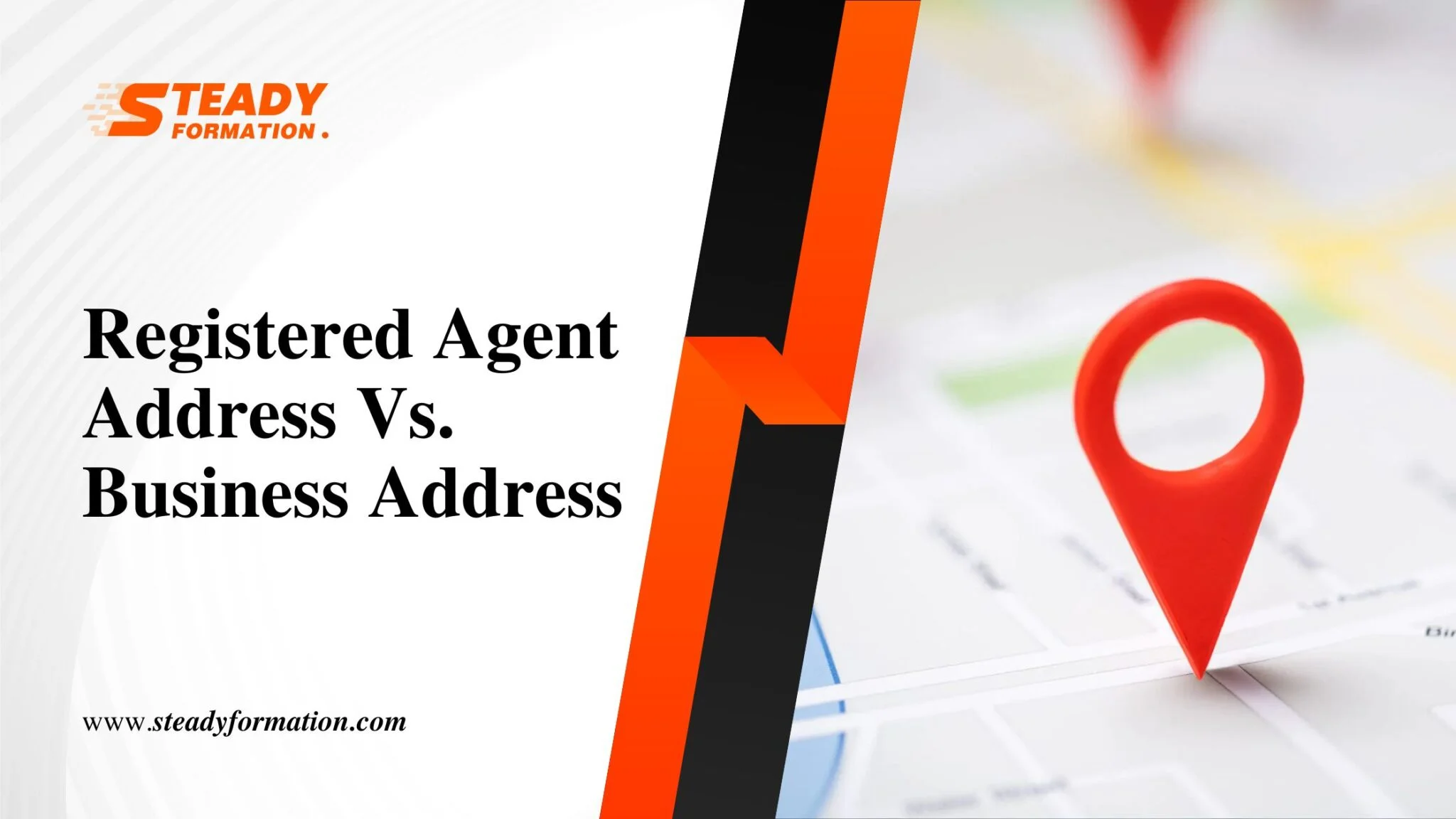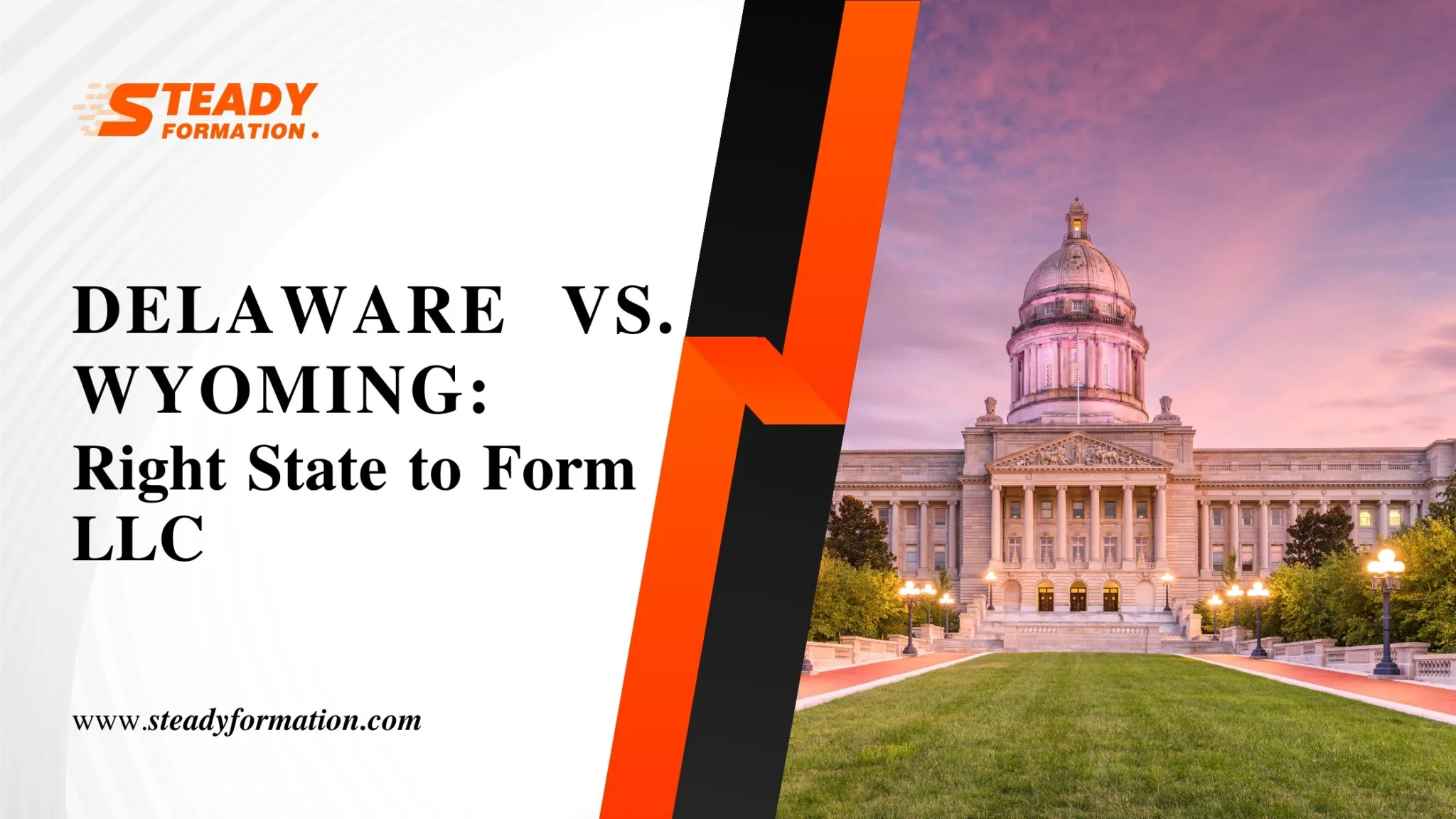When starting your new business venture or LLC in the United States, you might encounter some confusion regarding the distinction between the business address and the registered agent address. It’s natural to question whether these addresses are interchangeable or if they hold separate obligations.
While these two addresses may seem interchangeable at first glance, they actually have distinct requirements and fulfill different roles. This article aims to clarify the differences between the “registered agent address” and “business addresses,” delving into their respective functions and highlighting why they hold significance.
Let’s unravel this intricate topic.
Understanding the Registered Agent Address #
When a business designates an individual or entity to receive legal documents and vital notifications on its behalf, this designated party is known as a registered agent. The address associated with this role is termed the registered agent address.
Think of the registered agent as a reliable intermediary who collects official documents from the state government, such as tax notices and reminders for annual report filings. While they don’t typically engage in legal proceedings themselves, their main duty is to swiftly forward these documents to you, the business owner, ensuring you take the necessary steps in response.
Understanding the Business Address #
Now, let’s turn our attention to the business address.
Your business address is essentially the physical location linked to your company. When a business designates a specific physical address as its primary and legal point of contact for receiving mail, packages, and conducting operational communications, it becomes the business address.
This address serves as the official location listed on your business licenses, permits, and tax filings, thereby affirming your formal presence in a specific area.
With a clearer understanding of both addresses, let’s delve deeper into their respective roles and functionalities.
Why a Registered Agent Address is Important in the US #
- Legal Compliance: A registered agent address is like having a mailbox just for important government stuff. It helps you follow the rules by making sure you get all the legal papers you need.
- Receiving Legal Documents: This address serves as the designated destination for critical paperwork such as legal notices and tax documents. Its significance lies in keeping you informed about any significant developments concerning your business.
- Privacy Protection: Ever wanted to keep your personal life separate from your work? That’s where the registered agent comes in. Using a registered agent keeps your personal address private. Instead of legal papers showing up at your door, they go to your agent, who then sends them to you quietly.
- Timely Response: Your registered agent makes sure you get any papers quickly. This means you can deal with them fast, like paying taxes on time or responding to legal notices when needed.
In simple terms, having a registered agent address ensures your business follows the rules, just like how traffic lights guide cars on the road. It’s important to comply with the rules, and having the right tools in place helps you do just that.
Why Your Business Address Matters in the US #
- Handling Business Mail: Your business address is where all your business mail and packages are sent. It’s where you receive orders, payments, and messages from customers and partners.
- Building Trust: Having a real address makes your business look genuine and reliable. It shows customers and partners that you’re a legitimate business operating in a real location.
- Compliance with Regulations: Your business address is needed for official stuff like licenses and taxes. Making sure it’s correct on all your paperwork helps you comply with regulations and avoid problems.
In addition to official matters, your business address is where you actually conduct business. You might meet clients there, sell products, or carry out your work if you have a shop or office.
Key Differences: Registered Agent Address Vs. Business Address #
We’ve discussed the significance of each of these addresses, but how do they differ? Let’s explore the distinctions between a registered agent’s address and a business address.
Purpose
- Registered Agent Address: Receives legal documents and official notices from the state, mainly for handling legal matters.
- Business Address: Receives business-related mail and establishes the business’s presence and credibility.
Legal Requirement
- Registered Agent Address: Mandatory for LLCs and corporations in most states for legal compliance.
- Business Address: Required for business registration, licenses, and operational compliance.
Designated Party
- Registered Agent Address: This can be an individual or a professional service designated to receive legal documents.
- Business Address: typically the physical location where the business operates.
Handling of Documents
- Registered Agent Address: Receives legal papers and forwards them promptly to the business owner for action.
- Business Address: Receives all business-related mail, packages, and messages.
Privacy Protection
- Registered Agent Address: Protects the owner’s personal address by keeping it separate from public records.
- Business Address: This may expose personal information if the owner’s home address is used.
Location Flexibility
- Registered Agent Address: This can be located anywhere within the state of registration.
- Business Address: Tied to the physical location of business operations.
Operational Functions
- Registered Agent Address: Focuses on legal matters and compliance documents.
- Business Address: Supports day-to-day business activities.
Listing on Documents
- Registered Agent Address: Listed on official state documents for legal matters.
- Business Address: Listed on licenses, permits, and tax filings.
Notification of Changes
- Registered Agent Address: Changes must be promptly updated with the state.
- Business Address: Changes require updates to registrations and filings.
Can You Use the Registered Agent Address as the Business Address? #
Now, you might be wondering if you can use one address for both roles. Let’s explore this.
In most cases, yes, the US business address can also serve as the registered agent’s address. It’s perfectly acceptable and legal to use the same address for both roles if:
- The address has a physical location within the state where your business is registered.
- There’s someone available during regular business hours to receive legal documents on your behalf.
Consolidating both functions into one location simplifies document management and ensures you receive legal documents and business mail in the same place. If your business already has a physical presence, you may avoid the need to pay for an additional registered agent service.
Why Do Separate Registered Agent and Business Addresses Benefit Your Company? #
While using the registered agent address as your business address might seem convenient, it comes with potential drawbacks to consider.
- Privacy Risks: Mixing legal and operational functions could expose personal information in legal documents, posing privacy risks.
- Operational Challenges: Combining legal and operational functions at the same address may lead to confusion or delays in handling important legal papers, creating operational challenges.
- Regulatory Considerations: Some states have specific rules about the registered agent address, adding regulatory complexities to the decision.
Ultimately, using the same address for both purposes is feasible; a careful assessment of privacy, operational efficiency, and legal obligations is essential to making an informed decision that best serves the business’s needs.
Why Using Your Home Address for Your Business Isn’t a Good Idea #
Using your home address as your business address can pose several challenges, making it important to keep them separate.
Privacy Risks
Using your home address exposes your personal information, potentially leading to privacy risks such as unwanted visitors and security concerns.
Professional Image
Using a home address might not convey the professional image you want for your business, potentially raising doubts about your credibility among clients and partners.
Legal Considerations
Zoning laws in residential areas could pose legal challenges if you run a business from home, potentially leading to complications.
Mail Management
Mixing business and personal mail can lead to confusion and overlooked important documents, making it difficult to manage mail effectively.
Tax Implications
Tax filing can become complicated when your home is your business address, blurring the line between personal and business expenses.
Work-Life Balance
Using your home address for business purposes can disrupt your work-life balance, making it challenging to separate work from personal time.
For these reasons, it’s advisable to keep your business address distinct from your home address to avoid potential privacy, legal, and operational issues.
Final Thoughts #
For the business to run smoothly, you must know about the registered agent address vs. the business address. Your daily operations are conducted at your business address, whereas legal matters are taken care of at the registered agent address. Your privacy can be protected, your affairs can be managed better, and the trust of your clientele can be cultivated by confining these addresses separately and following the rules.
Therefore, recognizing and honoring the roles of both addresses is vital for embarking on a successful business journey.
Table of Contents
- Understanding the Registered Agent Address
- Understanding the Business Address
- Why a Registered Agent Address is Important in the US
- Why Your Business Address Matters in the US
- Key Differences: Registered Agent Address Vs. Business Address
- Can You Use the Registered Agent Address as the Business Address?
- Why Do Separate Registered Agent and Business Addresses Benefit Your Company?
- Why Using Your Home Address for Your Business Isn’t a Good Idea
- Final Thoughts


